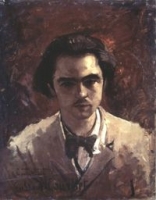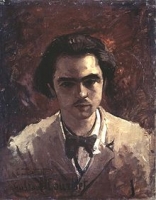閱讀魏爾倫 Paul-Marie Veriaine在诗海的作品!!! | |||
魏爾倫生於法國東部城鎮梅斯。他的父親是一格法國軍官,母親則是一個虔誠、富有的女人。他7歲時,舉傢前往巴黎。魏爾倫早年學過法律,做過保險公司的職員,他很快就對這份工作感到厭煩,並開始沉溺於酒精。
1870年,儘管魏爾倫有同性戀的傾嚮,但他還是娶了一個16歲的姑娘,並育有一子。他一邊活躍在上流社會的沙竜,同時也熱愛波希米亞群體。
魏爾倫着迷於波德萊爾的詩歌,1866年,他出版了他的第一本詩集。
他早期的詩風諷刺而沉思,類似於當時的印象主義。他的詩歌是人生片段的縮影:初吻、貝殼、街頭即景。
1871年,革命在巴黎爆發,魏爾倫支持巴黎公社,在激進的臨時政府中做過審查員。革命失敗後,他不再對政治感興趣,重新沉湎於杜鬆子酒和苦艾酒。1871年,魏爾倫發現了蘭波的詩歌天賦,並不顧輿論,瘋狂地愛上他。他們在倫敦和布魯塞爾過來人兩年的同居生活,在一係列爭執後,魏爾倫酒後開槍打傷了蘭波的手腕,因此入獄兩年。
1881年,魏爾倫出版了詩集《智慧》,銷量好於他以前的作品。
晚年,他陷入了更暗淡的主題,整天在巴黎的咖啡館狂飲苦艾酒,混跡於兩個妓女之間,揮霍他的版稅。
1894年,他出版了名為《死後書》的詩集,他的詩歌是自指的,一個豪飲苦艾酒的詩人的形象,成為詩歌的主題。
1896年,他死於一個妓女的傢中。
Early life
Born in Metz, he was educated at the lycée Bonaparte (now the lycée Condorcet),[1] in Paris and then took up a post in the civil service. He began writing poetry at an early age, and was initially influenced by the Parnassien movement and its leader, Charles Leconte de Lisle. Verlaine's first published collection, Poèmes saturniens (1866),[2] though adversely commented upon by Sainte-Beuve, established him as a poet of promise and originality.
Marriage and military service
Verlaine's private life spills over into his work, beginning with his love for Mathilde Mauté. Mauté became Verlaine's wife in 1870. At the proclamation of the Third Republic in the same year, Verlaine joined the 160th battalion of the Garde nationale, turning Communard on March 18, 1871.
He became head of the press bureau of the Central Committee of the Paris Commune. Verlaine escaped the deadly street fighting known as the Bloody Week, or Semaine Sanglante, and went into hiding in the Pas-de-Calais.
Imprisonment
Verlaine returned to Paris in August 1871, and, in September, he received the first letter from the poet Arthur Rimbaud. By 1872, he had lost interest in Mathilde, and effectively abandoned her and their son, preferring the company of his new lover.[2] Rimbaud and Verlaine's stormy love affair took them to London in 1872. In July 1873 in a drunken, jealous rage, he fired two shots with a pistol at Rimbaud, wounding his left wrist, though not seriously injuring the poet. As an indirect result of this incident, Verlaine was arrested and imprisoned at Mons, where he underwent a conversion to Roman Catholicism, which again influenced his work and provoked Rimbaud's sharp criticism. Romances sans paroles was the poetic outcome of this period.
Following his release from prison, Verlaine again traveled to England, where he worked for some years as a teacher and produced another successful collection, Sagesse. He returned to France in 1877 and, while teaching English at a school in Rethel, became infatuated with one of his pupils, Lucien Létinois, who inspired Verlaine to write further poems. Verlaine was devastated when the boy died of typhus in 1883.
Final years
Verlaine's last years witnessed a descent into drug addiction, alcoholism, and poverty. He lived in slums and public hospitals, and spent his days drinking absinthe in Paris cafes. Fortunately, the French people's love of the arts was able to resurrect support and bring in an income for Verlaine: his early poetry was rediscovered, his lifestyle and strange behavior in front of crowds attracted admiration, and in 1894 he was elected France's "Prince of Poets" by his peers. His poetry was admired and recognized as ground-breaking, serving as a source of inspiration to famous composers, such as Gabriel Fauré, who set many of his poems to music, including La bonne chanson, and Claude Debussy, who set five of the Fêtes galantes poems to music, forming part of the mélodie collection known as the Recueil Vasnier.[3]
Paul Verlaine died in Paris at the age of 51 on January 8, 1896., and was buried in the Cimetière des Batignolles.
Style
Verlaine in a caféMuch of the French poetry produced during the fin de siècle was characterized as "decadent" for its lurid content or moral vision. In a similar vein, Verlaine used the expression poète maudit ("accursed poet") in 1884 to refer to a number of poets like Stéphane Mallarmé and Arthur Rimbaud who had fought against poetic conventions and suffered social rebuke or were ignored by the critics. But with the publication of Jean Moréas' Symbolist Manifesto in 1886, it was the term symbolism which was most often applied to the new literary environment. Along with Verlaine, Mallarmé, Rimbaud, Paul Valéry, Albert Samain and many others began to be referred to as "Symbolists". These poets would often share themes that parallel Schopenhauer's aesthetics and notions of will, fatality and unconscious forces, and used themes of sex (such as prostitutes), the city, irrational phenomena (delirium, dreams, narcotics, alcohol), and sometimes a vaguely medieval setting.
In poetry, the symbolist procedure - as typified by Verlaine - was to use subtle suggestion instead of precise statement (rhetoric was banned) and to evoke moods and feelings through the magic of words and repeated sounds and the cadence of verse (musicality) and metrical innovation.
Portrayals
Rimbaud as drawn by VerlaineNumerous artists painted Verlaine's portrait. Among the most illustrious were Henri Fantin-Latour, Antonio de la Gándara, Eugène Carrière, Frédéric Cazalis, and Théophile-Alexandre Steinlen.
The time Verlaine and Rimbaud spent together was the subject of the 1995 film Total Eclipse, directed by Agnieszka Holland and with a screenplay by Christopher Hampton, based on his play. Verlaine was portrayed by David Thewlis.
Works
Verlaine's Complete Works are available in critical editions from the Bibliothèque de la Pléiade.
Poèmes saturniens (1866)
Les Amies (1867)
Fêtes galantes (1869)
La Bonne chanson (1870)
Romances sans paroles (1874)
Sagesse (1880)
Les Poètes maudits (1884)
Jadis et naguère (1884)
Amour (1888)
Parallèlement (1889)
Dédicaces (1890)
Femmes (1890)
Hombres (1891)
Bonheur (1891)
Mes hôpitaux (1891)
Chansons pour elle (1891)
Liturgies intimes (1892)
Mes prisons (1893)
Élégies (1893)
Odes en son honneur (1893)
Dans les limbes (1894)
Épigrammes (1894)
Confessions (1895)
References
^ Article in Wikipedia français
^ a b Paul Verlaine. Litweb.net. Retrieved on 2007-07-18.
^ Rolf, Marie. Page 7 of liner notes to Forgotten Songs by Claude Debussy, with Dawn Upshaw and James Levine, Sony SK 67190.
Paul Verlaine, Correspondance générale: [Vol.] I, 1857-1885 (edited and annotated by Michael Pakenham). Paris: Fayard, 2005. 16 x 24 cm. 1,122 pages. ISBN 2-213-61950-6

